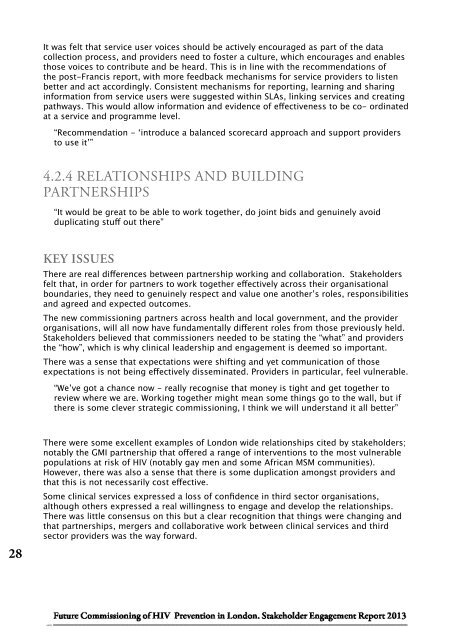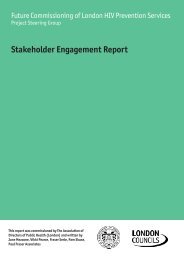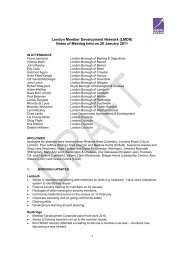Stakeholder Engagement Report - London Councils
Stakeholder Engagement Report - London Councils
Stakeholder Engagement Report - London Councils
You also want an ePaper? Increase the reach of your titles
YUMPU automatically turns print PDFs into web optimized ePapers that Google loves.
It was felt that service user voices should be actively encouraged as part of the data<br />
collection process, and providers need to foster a culture, which encourages and enables<br />
those voices to contribute and be heard. This is in line with the recommendations of<br />
the post-Francis report, with more feedback mechanisms for service providers to listen<br />
better and act accordingly. Consistent mechanisms for reporting, learning and sharing<br />
information from service users were suggested within SLAs, linking services and creating<br />
pathways. This would allow information and evidence of effectiveness to be co- ordinated<br />
at a service and programme level.<br />
“Recommendation - ‘introduce a balanced scorecard approach and support providers<br />
to use it’”<br />
4.2.4 Relationships and building<br />
partnerships<br />
“It would be great to be able to work together, do joint bids and genuinely avoid<br />
duplicating stuff out there”<br />
Key issues<br />
There are real differences between partnership working and collaboration. <strong>Stakeholder</strong>s<br />
felt that, in order for partners to work together effectively across their organisational<br />
boundaries, they need to genuinely respect and value one another’s roles, responsibilities<br />
and agreed and expected outcomes.<br />
The new commissioning partners across health and local government, and the provider<br />
organisations, will all now have fundamentally different roles from those previously held.<br />
<strong>Stakeholder</strong>s believed that commissioners needed to be stating the “what” and providers<br />
the “how”, which is why clinical leadership and engagement is deemed so important.<br />
There was a sense that expectations were shifting and yet communication of those<br />
expectations is not being effectively disseminated. Providers in particular, feel vulnerable.<br />
“We’ve got a chance now - really recognise that money is tight and get together to<br />
review where we are. Working together might mean some things go to the wall, but if<br />
there is some clever strategic commissioning, I think we will understand it all better”<br />
28<br />
There were some excellent examples of <strong>London</strong> wide relationships cited by stakeholders;<br />
notably the GMI partnership that offered a range of interventions to the most vulnerable<br />
populations at risk of HIV (notably gay men and some African MSM communities).<br />
However, there was also a sense that there is some duplication amongst providers and<br />
that this is not necessarily cost effective.<br />
Some clinical services expressed a loss of confidence in third sector organisations,<br />
although others expressed a real willingness to engage and develop the relationships.<br />
There was little consensus on this but a clear recognition that things were changing and<br />
that partnerships, mergers and collaborative work between clinical services and third<br />
sector providers was the way forward.




